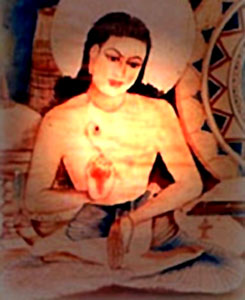 Sankaradeva was a saint, visionary, humanist, social reformer, poet, dramatist, painter, and musician. Born in 1449 he spearheaded a remarkable socio-cultural resurgence in the wake of the neo-Vaishnava Bhakti movement. This flourished in Assam during the fifteenth and sixteenth centuries. Neo-Vaishnavism under his exalted and inspiring leadership brought a full-scale transformation that encompassed an amazing range of human thought and activity, from the spiritual to the aesthetic. A very notable feature of Sankaradeva`s movement was that it made the fullest use of diverse types of creative and artistic media like literature, music, dance, drama, painting, sculpture, and architecture, and made them integral to the new faith and its order. Thus some of the finest treasures of Assamese culture owe their efflorescence to him. By and large their repositories have been the satras or monasteries that represent the organizational aspect of the faith. To this day, Sankaradeva`s influence and his movement pervade the entire field of traditional life, often cutting across religious and sectarian divisions. Sankaradeva was not only the founder of Assam Vaishnavism but he was far greater as a socio-cultural architect. For centuries past Neo-Vaishnavite literatures continue to be the model and life-blood of Assamese culture and literary heritage. The Vaishnavite Satras and the Namghars have become the religious and socio-cultural nerve-centres particularly in rural areas to unify the rural fold and to go ahead individually and collectively in an atmosphere of serenity.
Sankaradeva was a saint, visionary, humanist, social reformer, poet, dramatist, painter, and musician. Born in 1449 he spearheaded a remarkable socio-cultural resurgence in the wake of the neo-Vaishnava Bhakti movement. This flourished in Assam during the fifteenth and sixteenth centuries. Neo-Vaishnavism under his exalted and inspiring leadership brought a full-scale transformation that encompassed an amazing range of human thought and activity, from the spiritual to the aesthetic. A very notable feature of Sankaradeva`s movement was that it made the fullest use of diverse types of creative and artistic media like literature, music, dance, drama, painting, sculpture, and architecture, and made them integral to the new faith and its order. Thus some of the finest treasures of Assamese culture owe their efflorescence to him. By and large their repositories have been the satras or monasteries that represent the organizational aspect of the faith. To this day, Sankaradeva`s influence and his movement pervade the entire field of traditional life, often cutting across religious and sectarian divisions. Sankaradeva was not only the founder of Assam Vaishnavism but he was far greater as a socio-cultural architect. For centuries past Neo-Vaishnavite literatures continue to be the model and life-blood of Assamese culture and literary heritage. The Vaishnavite Satras and the Namghars have become the religious and socio-cultural nerve-centres particularly in rural areas to unify the rural fold and to go ahead individually and collectively in an atmosphere of serenity.
Sankaradeva was not only the founder of Assam Vaishnavism but he was far greater as a socio-cultural architect. For centuries past Neo-Vaishnavite literatures continue to be the model and life-blood of Assamese culture and literary heritage.
The Vaishnavite Satras and the Namghars have become the religious and socio-cultural nerve-centres particularly in rural areas to unify the rural fold and to go ahead individually and collectively in an atmosphere of serenity. Sankaradeva`s religion thus puts equal stress upon the highest of Upanishadaic teachings. His religious teachings emphasize the basic moral code to weave out the way to emancipation from all mundane sufferings. Assam Vaishnavism of Srimanta Sankaradeva covers the main tenets of the major Upanishads and the teachings of the Bhagavata-purana and a few other Vedantic texts.
Sankardeva in order to propagate his religious doctrines began composing literary works, poems and dramas. He had translated Bhagavatam. This was the starting point of enthusiasm and inspiration for Assamese literature. His intelligence is evident in the poem Harischandra upakhyana which was composed when he was in his teens. The poetical work that has given Sankardeva great fame is the Kiriana that contains 26 poems and 2,261 couplets. He is noted for clear and chiseled phrasing. The Sisulila and the Adi Dasama also contain captivating portraits of Lord Krishna`s childhood. This also revealed in his Bargeetas and Ankargeetas. He laid the foundation of mysticism in Assamese literature with his Bargeetas and Ankargeetas.
Sankaradeva`s religion, further, brought a new meaning and depth to social and cultural life. For the first time in Assam`s history, he asserted the dignity of man in society independent of the accidents of birth and social rank, and established the spiritual equality of all men. In his fraternity, Brahmanas, Sudras and men of lower birth enjoyed equal liberty of worship, devotion and prayer.
Two of his greatest contributions to the performing arts were a unique type of devotional singing called Bargit or `great songs`. This was based on a distinctive system of ragas and talas, and the pioneering vernacular drama known as Ankiya Nat. He wrote six mythological plays in praise of Vishnu`s avatars. The names can be mentioned as Patniprasada i.e. `Wives` Offerings`, Keli-Gopala i.e. `Gopala`s Games`, Kali-damana i.e. `Subjugating Kaliya`, Rukmini-harana i.e. `Stealing Rukmini`, Parijata-harana or `Stealing the parijata Flower`, and Rama-vijaya or `Rama`s Victory`. He also set the model for the Bhaona style of theatre. Sankaradeva was a Sanskrit scholar. He incorporated elements of classical dramaturgy into his plays. Ankiya Nat and Bhaona continue to hold sway over traditional Assamese theatre to this day. They are also known to have had extra-regional influence in other parts of eastern India. This great person died in 1568.









